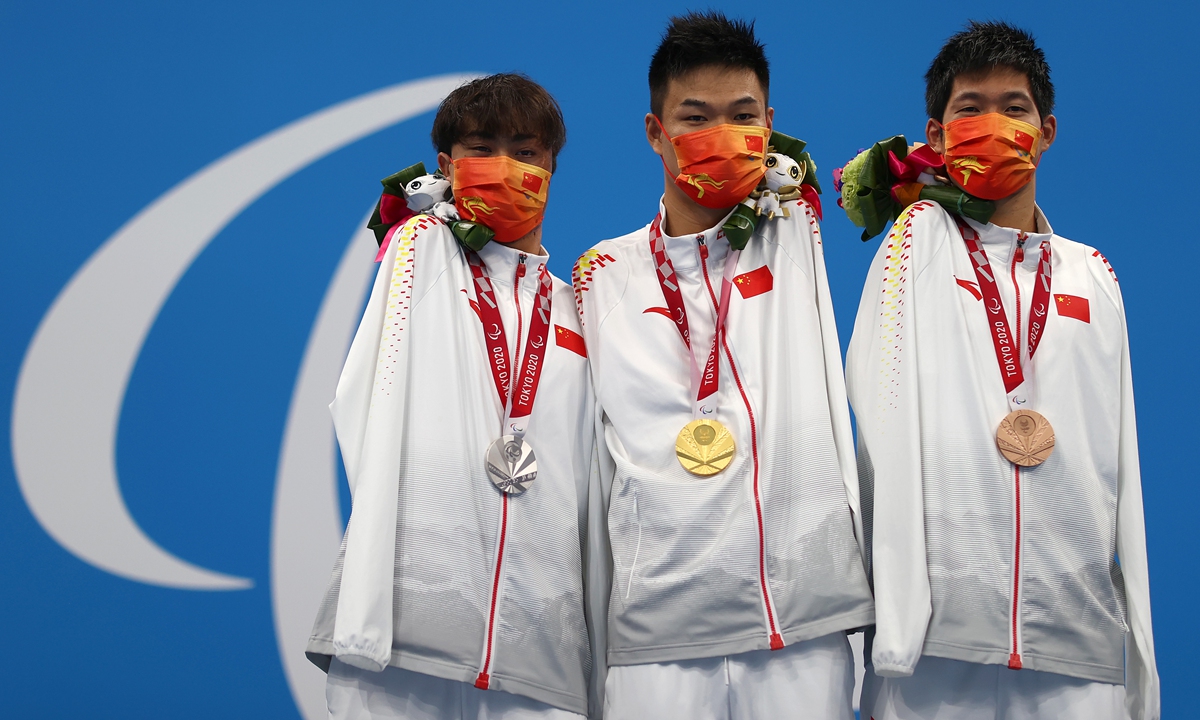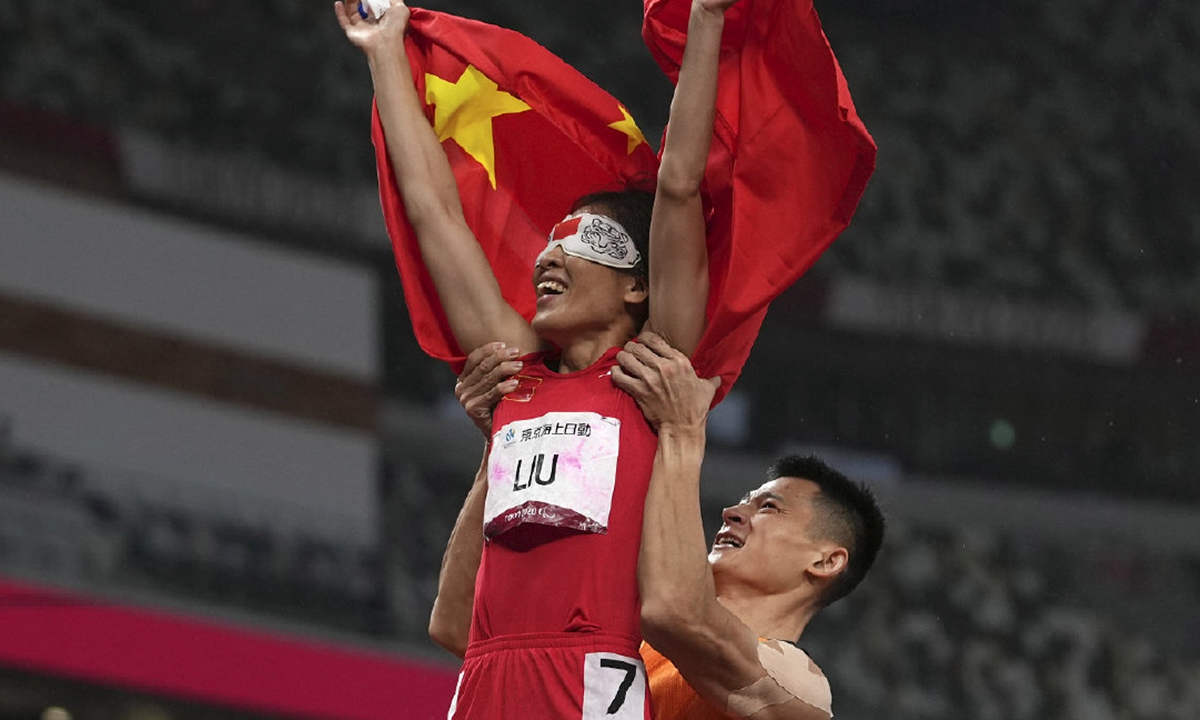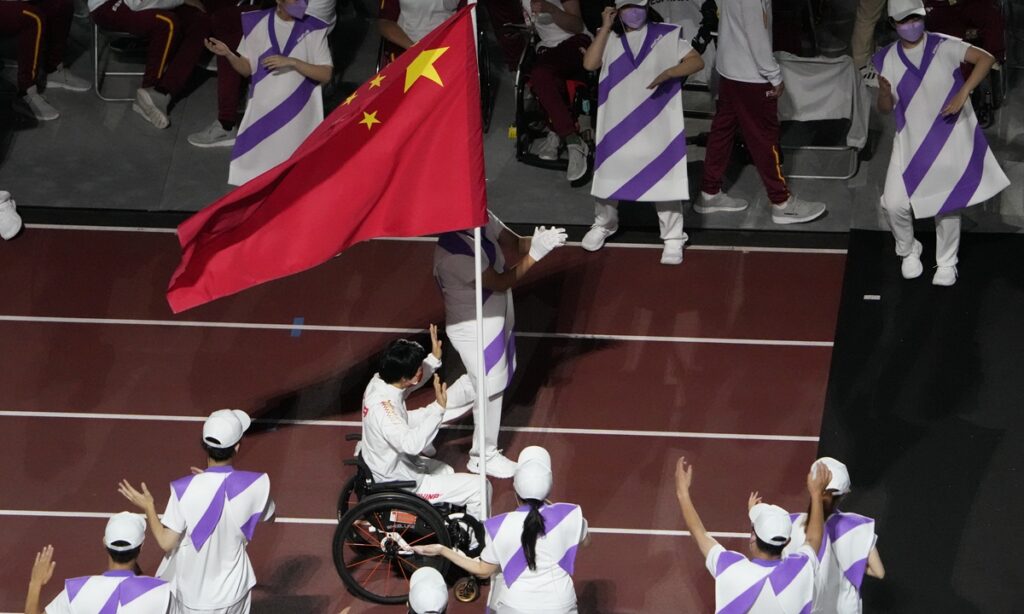Bagging 207 medals and placing first by a huge margin in the medal count, Paralympicsfinished the Tokyo Paralympics with a swinging gesture. It was the fifth consecutive time that China ranked top in the medal count in the Paralympics.
Other than the medals, more importantly, athletes with physical disabilities once again displayed courage, self-reliance and breakthroughs, embodying a national spirit and inspiring more physically challenged people as well as the entire society, observers noted.
After Qu Zimo and Mai Jianpeng, the wheelchair badminton duo, claimed gold in men’s doubles WH on Sunday, all competitions involving Chinese athletes ended. During the 13 match days, Chinese athletes snatched 96 gold medals, 60 silver medals, and 51 bronze medals, ranking first among all teams.
On Sunday afternoon, the State Council, China’s cabinet, sent a congratulatory message to the delegation.
“You have overcome the severe challenges posed by the COVID-19 pandemic, fully demonstrated the spirit of challenging the limits, forging ahead and striving for the excellence of our physically challenged athletes in the new era, and injected the spirit of strength into the whole nation,” the congratulatory message said.
Zhang Xuemei, a wheelchair basketball player, was appointed as Team China’s flag bearer for the closing ceremony of the Games on Sunday night. Zhang won a silver medal with her teammates at the games, setting a Paralympics record for Chinese wheelchair basketball.
Apart from wheelchair basketball, Team China delivered outstanding performances in several other events. Chinese athletes won gold, silver and bronze medals in the same event four times, including the men’s 50m Freestyle-S5, where Zheng Tao, Yuan Weiyi and Wang Lichao were on the podium at the same time. Pistol and table tennis were also among Team China’s strengths.

Silver medalist Yuan Weiyi (left), gold medalist Zheng Tao (center) and bronze medalist Wang Lichao pose on the podium after the men’s 50 meters freestyle – S5 final. Photo: VCG
Chinese athletes also made breakthroughs in track and field projects, just like their fellow athletes did at the just-finished Tokyo Olympics. Zhu Dening, a Chinese track and field athlete making his Paralympic debut, broke the world record in the men’s Long Jump-T38 final. Deng Peicheng, Sun Pengxiang and Mi Na also set new records in their events.
During the Paralymics, Chinese netizens were touched by the stories of many athletes, including Wang Rui, a girl who lost her right leg in the Wenchuan earthquake in 2008. She won a gold in the women’s team tabletennis Classes 6-8 tournament. She said that after losing a leg, it was tabletennis that gave her a second chance at life.

Chinese track and field athlete Liu Cuiqing and Xu Donglin at the Women’s 200m-11T event at the Tokyo Paralympic Games. Photo: Sina Weibo
Blind runner Liu Cuiqing and her guide Xu Donglin, who has accompanied her for many years, also touched netizens’ hearts. After winning the gold medal in the women’s 400m T11, he lifted her and she lifted the national flag.
Netizens were also amazed by Ibrahim Hamadtou, the Egyptian armless table tennis player who plays with his bat in his mouth, as many emphasized that the Paralympic spirit behind these medals is far more important than the numbers itself.
“The nature of the Paralympics is different from the Olympics. It’s not that the athletes are different; it is just that the Paralympics have a symbolic meaning that reflects humanitarian concepts such as human capabilities and equal rights for disabled groups. Also, it reflects the host country’s social responsibility,” Zhang Pingting, a sport insider, told the Global Times.
Team China’s success was partly due to the larger size of the delegation sent compared with other countries, but more importantly it was thanks to the increasing livelihood support for people with disabilities in China, which led to more of them joining sports, Wang Dazhao, a Beijing-based veteran sports commentator, told the Global Times on Sunday.
A 437-member Chinese Paralympics delegation was sent to Tokyo, including 251 athletes (119 males and 132 females) and 186 coaches, staff and support staff.
“But the Paralympic Games should not be seen as a pure competition focused on wins or medals,” Wang said. “It is more about the physically challenged taking the stage to prove what they are capable of doing in something they love.
“Through the Games, they have proven their courage and independence to the world, embodying their resilience and inspiring more people with disabilities to have courage in their lives and gaining the world’s respect for them over and over again,” Wang said.
Observers noted that through the outstanding performance of Chinese athletes in this Paralympic Games, it is anticipated that further public attention will be drawn to people with disabilities, guaranteeing them more rights to choose their lifestyles without limits.
Zhang Xuemei, a wheelchair basketball player who was appointed as Team China’s flag bearer for the closing ceremony of the Paralympic Games, enters the National Stadium in Tokyo on Sunday night. Photo: VCG



